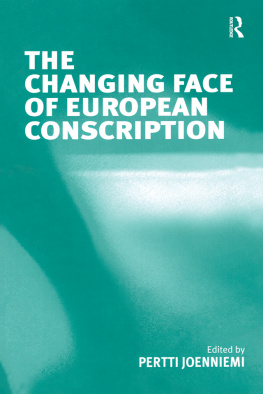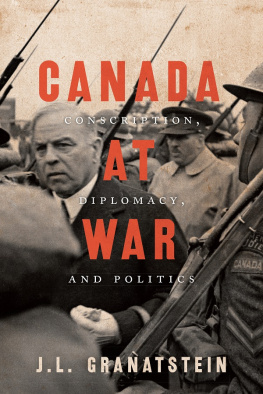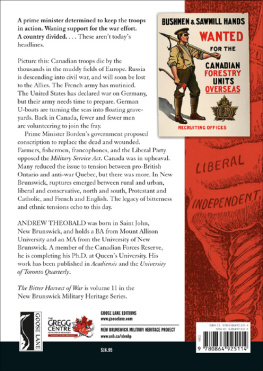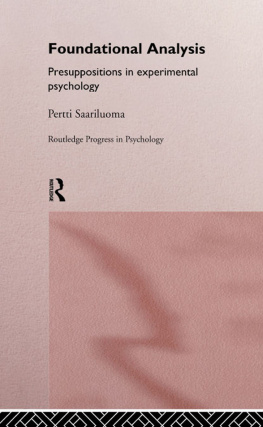THE CHANGING FACE OF EUROPEAN CONSCRIPTION
The Changing Face of European Conscription
Edited by
Pertti Joenniemi
Danish Institute for International Studies, Denmark
First published 2006 by Ashgate Publishing
Published 2016 by Routledge
2 Park Square, Milton Park, Abingdon, Oxon OX14 4RN
711 Third Avenue, New York, NY 10017, USA
Routledge is an imprint of the Taylor & Francis Group, an informa business
Copyright 2006 Pertti Joenniemi
Pertti Joenniemi has asserted his moral right under the Copyright, Designs and Patents Act, 1988, to be identified as the editor of this work.
All rights reserved. No part of this book may be reprinted or reproduced or utilised in any form or by any electronic, mechanical, or other means, now known or hereafter invented, including photocopying and recording, or in any information storage or retrieval system, without permission in writing from the publishers.
Notice:
Product or corporate names may be trademarks or registered trademarks, and are used only for identification and explanation without intent to infringe.
British Library Cataloguing in Publication Data
The changing face of European conscription
1. Draft - Europe - History - 21st century
I. Joenniemi, Pertti
355.2'2363'094'090511
Library of Congress Cataloging-in-Publication Data
The changing face of European conscription / edited by Pertti Joenniemi.
p. cm.
Includes bibliographical references and index.
ISBN 0-7546-4410-3
1. National state. 2. Draft--Scandinavia. 3. Draft--Germany.
4. Draft--France. I. Joenniemi, Pertti.
JC311.C45614 2005
355.2'2363094--dc22
2005023137
ISBN 9780754644101 (hbk)
Karsten Friis , MSc (IR) from Lse and Cand. Polit. from the University of Oslo, associated with the Norwegian Institute for International Affairs from 1996-99, has held various positions within the OSCE in the Balkans, as well as KFOR and the Norwegian Defence Staff. Currently Senior Political Officer in the OSCE Mission to Serbia and Montenegro.
Pertti Joenniemi is Senior Research Fellow at the Department for European Affairs, Danish Institute of International Studies. He is co-author of the NEBI Yearbook on North European and Baltic Sea Integration (Springer Verlag). His most recent book is The Nordic Peace (2003), edited together with Clive Archer.
Annica Kronsell is Assistant Professor, Department of Political Science at Lund University where she teaches courses in international relations. Her current research focuses on gender and the new Swedish security context and the changing role of military-civil relations.
Kari Laitinen , Dr.Soc.Sc., works currently as a Lecturer in the Department of Political Science at the University of Helsinki. His research interests focus on the theoretical aspects of International Relations and particularly on the security issues of World politics.
Anna Leander is Associate Professor at the University of Southern Denmark (Odense) and at the Copenhagen Business School. Her research focuses on contructivism in IR/IPE with an emphasis on the authority over the use of force. She has recently published in Millennium, Journal of Peace Research and (understanding the Fate of Conscription) in Armed Forces & Society.
Jean-Philippe Lecomte , Matre de confrences in political science at the university Franois Rabelais of Tours (France). He graduated from the institut dtudes Politiques de paris with a doctoral thesis on the representations and the reality of the social functions of military service in French society (2001). He works on the relations between armed forces and society.
Kerry Longhurst is Lecturer in European Security at the European Research Institute, University of Birmingham. Her recent publications include Germany and the Use of Force (Manchester University Press: Manchester) and Old Europe, New Europe and the Transatlantic Security Agenda (Routledge: London).
Erika Svedberg is Assistant Professor at the Center for Feminist Social Studies, Department of Social and Political Sciences at rebro University. Her research interests are: feminism and globalization; gender relations and change in Swedens defence organization and policy; gender, citizenship, democracy and the volunteer organizations in the Defence. Together with Annica Kronsell she has published The Duty to Protect: Gender in the Swedish Practice of Conscription in Cooperation and Conflict .
This book is part of a Nordic Security Policy Research Programme headed by Professor Bengt Sundelius, University of Uppsala. The programme has been financed by the Nordic Council of Ministers as well as the Nordic Ministries of Defence. The group working on the changing face of European conscription has been part of a larger project focused on comparative Nordic security thinking, a project headed by Director of Research, Teija Tiilikainen from Helsinki University. The funding provided by the Nordic programme has allowed the subgroup working on conscription to come together in workshops organized in Oslo, Helsinki and Copenhagen, during which the ideas behind this edited volume germinated. Finally, the manuscript was completed whilst the Editor was a Senior Research Fellow at the Copenhagen peace research Institute and since 2004 Senior Research Fellow at the Department of European Affairs at the Danish Institute of International Studies.
Pertti Joenniemi
Chapter 1
Introduction: Unpacking Conscription
Pertti Joenniemi
Conscription played a crucial role in creating the world as we know it today Mjset and Van holde, 2002: xiii.
The Task
This book aims at exploring the background, state of affairs and possible future of conscription in six European countries: Denmark, Finland, France, Germany, Norway and sweden. They differ from each other to a considerable degree with one of them, France, having abandoned conscription already in 1996, changes recently underway in most of the others and with Finland as the most stubborn case that has so far stood its ground resisting pressures for hollowing out conscription.
My purpose in this introductory chapter is to set the stage for an exploration of the policies and options available for the countries in question. Following a standard approach, the core question to be asked could read: with France already on the clear, when do the rest see the light of the day and abort conscription? Or even more pointedly, why do Germany and the Nordics have particular difficulties in grasping the message that staying with the traditional system of drafting makes them look hopelessly outdated in current-day Europe?
This line of posing questions would, if pursued, be transitionist in essence. It would amount to a rather teleological story concerning a group of European countries striving towards a self-evident if not axiomatically given end-goal. In essence, the questions pursued would be ingrained in assumptions about the fate of conscription being decided by what conscription does rather than what it represents as a military manpower system and a broader politico-social bargain. They would be grounded in a rather functionalist reasoning, i.e. departures that do not give much credit to the various ideational aspects pertaining to conscription. Moreover, if the broader societal forces of transformation are taken into account, the way of posing questions would have to depart from that the intra-military pressures for doing away with such a system are, in fact, backed up by various social forces critical in view of conscription. These two would be comprehended as working in tamdem with both the military and the broader social reasoning pointing to conscription being on its way out of history.








